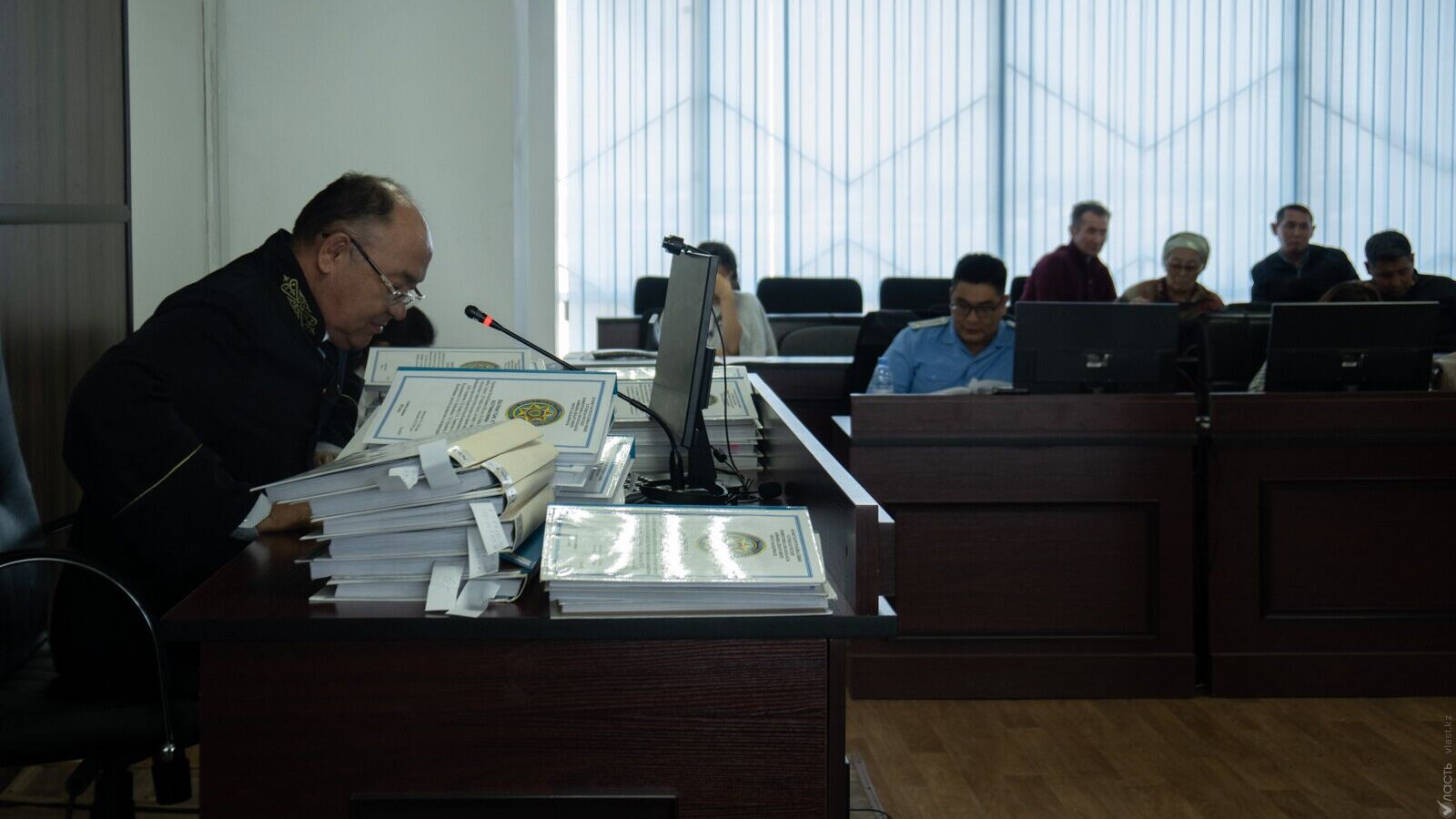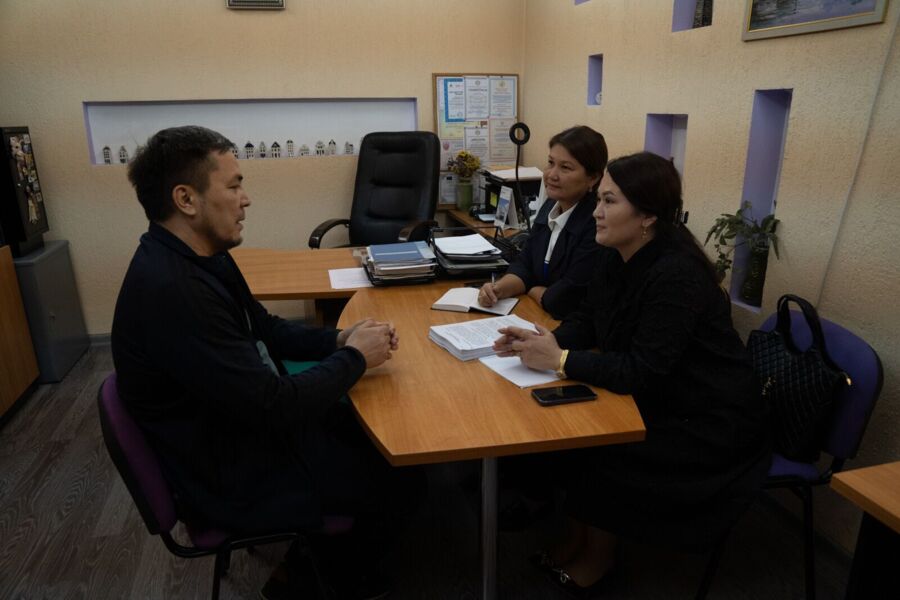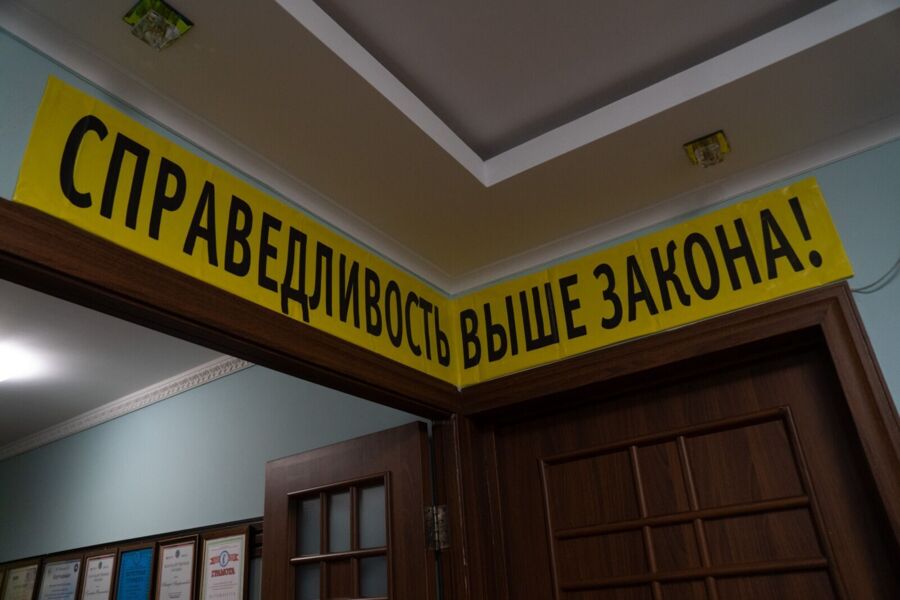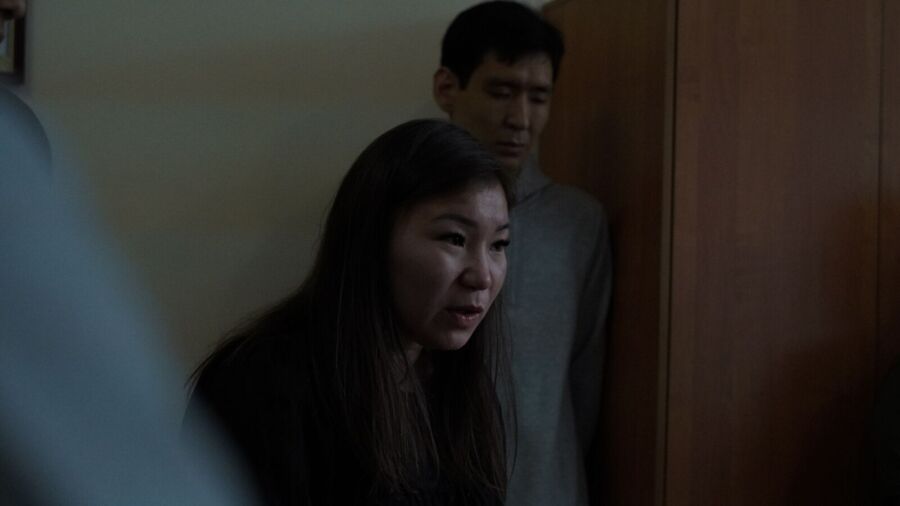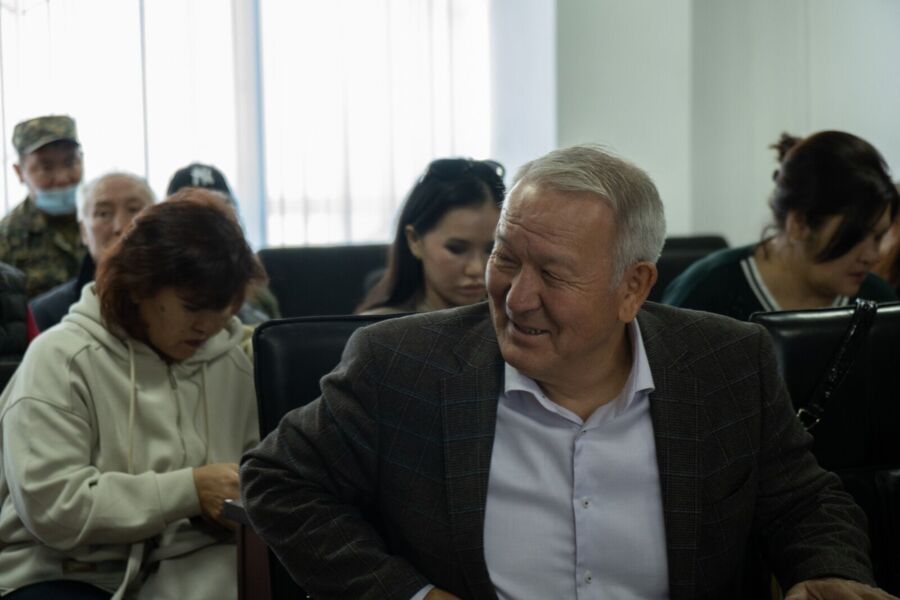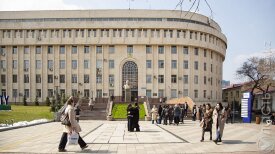In May 2022, a number of people gathered in a cramped office room in Almaty to meet with three lawyers, Tolegen Berlikozha, Ainara Aidarkhanova, and Zhalgas Saparkhanova. They were some of the participants in Qandy Qantar (Kazakh for “Bloody January”, the violent repression of urban protests across the country), and they wanted justice.
Some of them had been victims of violence during the events of Qandy Qantar, some had suffered torture during their detention. Around 10,000 people were arrested in the commotion of January 2022, which resulted in 238 killed and thousands injured.
Vlast spoke with the three lawyers, who are still defending their clients, more than a year and a half later.
Hard Work and High Hopes
Zhalgas Saparkhanova hurries towards us, clutching a sheet of paper in her hands. She smiles, because she was just notified that the case of Yerbol Zhumanov, sentenced to 16 years for the murder of a KNB lieutenant colonel and theft of weapons during the January events, will be considered in the Supreme Court.
“Our appeals had been denied several times before this. This was the case for Zheniskhan Ozhet and Bakyt Ontai, who were then released under an amnesty. I was worried that Yerbol’s case would also be barred from reaching the Supreme Court. But today this letter arrived,” she says, showing us the document. “I cried with joy, I really hope that he will be released. I have high hopes for this trial.”
Saparkhanova began her career in 2019, her first case was a minor accused of robbery.
When we met, Saparkhanova planned several talks with clients and a visit to both the Kazakhstan International Bureau for Human Rights and the International Legal Initiative, two organizations that helped her with Qandy Qantar cases.
“This has been going on for two years now. These organizations tasked me with half of my current cases. They helped pay for both the defense and the care for victims of torture,” she says.
While driving her car, Saparkhanova lists her weekly schedule of trials: “On Monday, Arman Zhumageldiyev’s case. On Tuesday, the case regarding the attack on buildings during the January events. Next week it’s trial after trial.”
Back at Saparkhanova’s office, the room is noisy: Other lawyers are taking calls and writing appeals. Outside, Almat Zhumagulov, convicted in 2018 in the “jihadist case,” is waiting for Saparkhanova. As she enters the office, she knows she will be with clients until sunset.
A few days later, we followed Saparkhanova to a court hearing, in which her client saw his fine for “participating in a banned organization” reversed. Outside the court, they smile as they take a selfie together. An elderly man soon approaches her for advice about his bank account, which had been blocked.
Qandy Qantar
The January 2022 protests started in Zhanaozen, an oil town in the Mangistau region, over the sharp increase of liquefied petroleum gas, a common fuel for cars in western Kazakhstan. Two days later, on January 4, the protest had spread across the country, leading to a violent repression by law enforcement against the people in the streets, be them peaceful protests or organized looters. What followed were days of fear and uncertainty, during which the government called for a strict curfew (President Kassym-Jomart Tokayev tasked the police to “shoot without warning” on January 7) and shut down internet connection.
Saparkhanova was in the office on January 7, when the phone rang. It was the Almaty police department, asking her to take up the defense of a minor, who had been caught stealing. Because of the ongoing turmoil and the curfew across the city, Saparkhanova had to defend the boy over the phone.
Her work with the minor brought to her desk even more cases, as parents asked Saparkhanova to deal with the fate of their children, who had been arrested and were out of reach.
The first time she was able to see her clients in person, she remembers witnessing the physical and psychological signs of torture.
“The January Events left an unforgettable mark on me. After these cases I wanted to retire. I met many people and saw what they faced. It was difficult to listen to their experience and see their wounds,” Saparkhanova told us.
One of several cases that changed her career in the last two years was that of Yerbol Zhumanov, a Taraz resident. Last year he was sentenced to 16 years in prison for murdering an officer of the National Security Committee (KNB) and stealing weapons.
“Before the verdict, another Taraz resident asked me to get involved, saying that Zhumanov was not guilty. At the time, I was working at the same time on the ‘airport hijacking’ and on the ‘case of the 25’ - one of whom was tried posthumously. I couldn’t physically handle another case,” Saparkhanova said.
But the verdict motivated her to help Zhumanov find justice.
After several rounds of hearings and appeals, however, the verdict remained unchanged.
“We thought we would win, because we had all the evidence towards his innocence. But it was all thrown out. And I thought: If a court only makes a judgment based on evidence from the prosecutor, why do we have lawyers for? I lost hope,” Saparkhanova said.
It was Zhumanov, who reassured her that he would be eventually acquitted by the Supreme Court.
“I thought: So many people rely on me that I need to keep it up and be strong,” Saparkhanova said.
The amount of work took a toll on Saparkhanova’s private life, as she struggles to give enough attention to her family, sometimes.
Justice Above the Law
Diplomas and certificates crowd the walls of the hallway that leads to the office of lawyers Ainara Aidarkhanova and Gulnara Zhuaspayeva, Aidarkhanova’s mother.
Upon entering the room, we pass under a banner that says: “Justice is above the law!”.
Both mother and daughter are involved in high-profile criminal cases related to Qandy Qantar.
Aidarkhanova has helped her mother since she was a child, and when she was a student she worked part time as an assistant to a judge. She knew from an early stage about the drawbacks of the job and she wanted to avoid a career as a lawyer.
“At that time my mother traveled all over the country, online didn’t exist yet. I didn’t see her often and I missed her. Only with time I realized that I really wanted to be a lawyer,” she says.
Aidarkhanova received a lawyer's license three years ago and is now a member of the juvenile board. She deals with cases related to children's rights, as well as civil and criminal cases: from divorce to murder.
It is illegal for lawyers to advertise their practice, therefore most of their clients reach them by word of mouth.
“You won’t see big banners anywhere here like in American movies,” she adds.
Aidarkhanova defends Aigerim Tleuzhan, a civic activist accused in the “airport hijacking” case.
On 5 January 2022, a number of demonstrators went to the airport building in Almaty, to show their dissent towards Kazakhstan’s decision to seek assistance from the Collective Security Treaty Organization (CSTO). Upon reaching the scene, the protesters discovered that the police had already left the building.
The activists wanted to rescind the alleged green light given to Russian and other foreign troops. Upon learning that Russian troops were not en route to the city at that moment, however, they left the airport area.
Despite their minor role and presence inside the airport building, five of these activists were sentenced earlier this summer for having “violently hijacked the airport”. They received prison terms from four to eight years.
Aidarkhanova participated in an online hearing for Tleuzhan’s appeal. The defendant strongly believes that her sentence was politically motivated.
The hearing was marred by technical issues, as some of the participants were muted and could not use their time properly. Aidarkhanova meanwhile had several court filings open on her screens. She patiently waited for the appeal verdict and, as the bailiff read it, she mouthed “rejects”. To her disappointment, she was right.
For Aidarkhanova, Qandy Qantar marked a watershed in her career. During those days, she worked around the clock, moving between detention centers. She says she still feels like it’s 2022.
“Such emotional cases squeeze all the energy out of you. Sometimes I ask my mother to avoid ‘political topics’ when we talk. All this has had side effects on our mental and physical health,” Aidarkhanova says.
Since February 2022, she has defended several people accused of participating in the January Events, some of whom suffered torture while in detention. Because of the lengthy trials, she says she developed an emotional bond with her clients.
“Of course there are rules and we must respect boundaries. But some people leave a mark. For example, I became friends with Kosai and Aigerim. I empathize with them as I help them. I don’t regret this. I recently attended the funeral for Kosai’s mother. There is a great deal of mutual respect,” Aidarkhanova says.
The “airport hijacking” case, according to Aidarkhanova, showed no evidence of Tleuzhan’s guilt.
“All witnesses agree that Tleuzhan did not ‘lead them’ as the prosecution argues. And still the court came to a harsh [four-year] sentence against her. I could not believe it, but the court simply agreed to the charges brought against her,” Aidarkhanova tells us.
“It’s not easy to make peace with an unfair decision. But I was able to get some rest and then return to my daily fight against evil,” she laughs.
In September, an Almaty court ruled that Aidarkhanova and other lawyers had disrupted a hearing of the “airport hijacking” case and their licenses could now be revoked.
A Coup... with a Tractor
Tolegen Berlikozha has been a lawyer for 15 years, after decades of experience in the internal affairs department in Astana. He sits among activists and journalists at the Specialized Interdistrict Court in Almaty, as the hearings begin. Seven people are in the dock, tried for “organizing mass riots, calls to seize power, and extremism” in November 2022. He defends two of them, Bagdagul Andreyeva and Tenlik Nurlanov.
With a monotonous voice, the prosecutor almost indistinctly reads from the hundreds of pages of the case for the entire length of the hearing, from 10am to 5pm. The defendants and the other attendees often ask the prosecutor to speak more clearly, but he continues to mumble hurriedly.
Just before the court is adjourned, Berlikozha tries to take the floor to complain that the defendants’ words were distorted in the prosecutor’s filing, but the judge interrupts him. “First comes the horse, then the cart,” he said, promising that there would be time for the defendants to tell their version at a subsequent hearing.
When we meet Berlikozha back at his office in Almaty, he tells us about his clients.
“Bagdagul Andreyeva is a blogger, she helped residents in the aftermath of Qantar. One of these got drunk one day and rambled about covering a tractor with cement tiles and using it to take Akorda, the presidential palace. But did the prosecutor take into account that this statement was made in Almaty and Akorda is in Astana? Where is the tractor this guy fantasized about? How would they carry out a coup without financial means? These are regular people.”
After retiring from internal affairs, Berlikozha continued to focus on matters of justice. He joined the Adilet-Ar law practice, which he now runs.
“We mainly protect the opposition. I believe the country’s authorities are to blame for most of the criminal activity. People resort to theft and crime out of hopelessness,” he says.
Besides paid work, Berlikozha also works pro-bono or with defendants whose fees are paid by the Kazakhstan International Bureau for Human Rights.
During Qandy Qantar, Berlikozha says that some people indeed broke the law, but the reaction from the authorities was disproportionate against some.
“The reality is that provocateurs ruined everything. Before it turned violent, I was glad that the people came out in those days. Corrupt groups that emerged during [former President Nursultan] Nazarbayev’s rule stole and sold our natural resources and brought the people to this difficult socio-economic situation,” Berlikozha tells us.
“My heart aches for my clients, some of whom only went outside to check what was going on.”
Hundreds of people are still on trial, almost two years after the events of Qandy Qantar. Human rights organizations have said that the country continues to live in agony, as families seek justice for the killed and the tortured. Around 1,000 people were able to obtain an amnesty if they admitted to minor, non-violent crimes.
Поддержите журналистику, которой доверяют.
